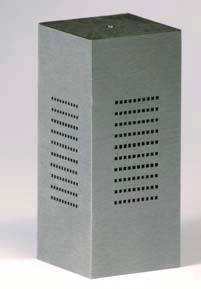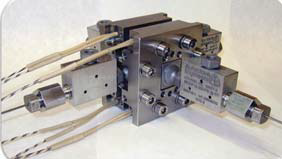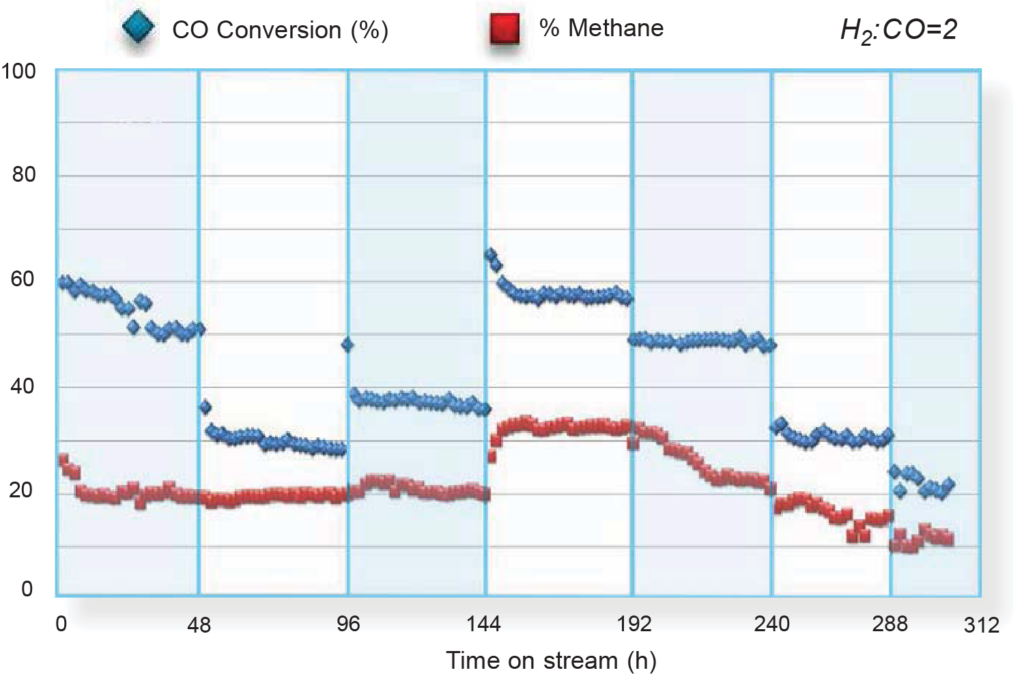PID-Micromeritics Microactivity Reference
L. C. Almeida1, O. Sanz1, J. D’olhaberriague2, S. Yunes3, M. Montes1
- Dep. de Química Aplicada, Facultad de Química, Universidad del País Vasco UPV-EHU, P. Manuel de
Lardizábal 3, 20018 Donostia-San Sebastián, España. - PID Eng&Tech, S.L. C/Plomo 15, Polígono Industrial Sur, 28770 Colmenar Viejo, Madrid, Spain
- Micromeritics Instruments Corporation, 4356 Communications Drive, Norcross, GA 30093, USA
Fischer-Tropsch Synthesis (FTS) is a well-known reaction that is gaining renewed attention due to growing interest in the micro- GTL process. Associated gases in offshore platforms and isolated onshore gas fields (stranded gas) require compact units able to transform gas into liquid fuel on a much smaller scale than is possible in conventional GTL plants. Consequently several papers, books, and patents have been published during the past decade from both industry and academia concerning the field of microchannel reactors including the GTL process and in particular FTS.
Microchannel technology offers new possibilities for FTS allowing highly compact units (process intensification), intrinsically safe functioning and excellent temperature control with substantial significance in control selectivity for liquid fuels (C5+ selectivity).
The objective of this communication is to present developments in adapting a catalytic test unit (PID-Micromeritics Microactivity Reference) for testing microchannel cross-flow blocks during FTS. The development permits the same unit to be used for testing powder catalysts, structured catalysts (monoliths), and microchannel blocks.
The microchannel blocks (Figure 1) present 100 microchannels (0.7 x 0.7 x 20 mm) coated with FT catalyst (20%Co-0.5%Re/Al2O3) perpendicularly interspersed with 100 similar microchannels for cooling [1].

The original unit allowed control of reactor temperature as well as pressure and flow of the different gas reactants. A second fluid line was developed to cool the exothermic FTS using pressurized water. This line includes a high-pressure pump, heater and thermocouple to control water temperature, a heat exchanger permitting a watercooling loop, pressure transducers, and a motorized needle valve to control water pressure.
The low compressibility of liquid water rendered initial attempts to control pressure impossible. Overcoming this problem required the addition of a container partially filled with air in order to cushion the very large pressure changes associated with the temperature fluctuations. The final strategy was to adjust the pressure set point of the cooling water to a pressure corresponding to at least 20 bar higher than water vapor pressure at the FTS temperature. Under these conditions, the cooling stream is highly stable.
Additional modifications were also necessary in the control software to include new control loops for the cooling stream (temperature and pressure) and monitoring of the high-pressure pump.

The microchannel block was fitted with CFD-designed headers assuring homogeneous gas velocity at the entry of all microchannels and graphite gaskets guaranteeing excellent sealing (<L0.01). A double housing ensures strength to the compression and deformation of the graphite gaskets and includes heating cartridges for the reduction pretreatment (Figure 2). A tee junction at each gas inlet and outlet allows thermocouples to be arranged in contact with each block face. In combination with thermocouples on the upper and lower surfaces of the block, this enables complete monitoring of the microchannel unit through-out the data logging facility of the control software.
Several reactions were carried out with microchannel blocks having different catalyst loads. The system proved highly stable. Standard tests were carried out over several weeks allowing for changes in flow, pressure and temperature. Figure 3 shows CO conversion and methane selectivity under different conditions in a typical experiment.

References
- L. C. Almeida, F. J. Ehcave, O. Sanz, M. A. Centeno, G. Arzamendi, L. M. Gandia, E. F. Sousa-
Aguiar, J. A. Odeiozola, M. Montes, , “Fischer- Tropsch Synthesis in Microchannels”, Chemical
Engineering Journal 167 (2011) 536–544.